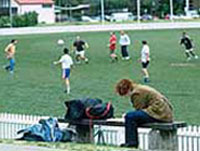|
|||||||||||||||||||||||||||||||||||||||||||||||
| Foundation of Facilitation - LAWS8077 | |||||||||||||||||||||||||||||||||||||||||||||||

Description In a multi-dimensional society there is a need for groups to work together to deliver projects. These groups either need to build consensus for their decisions or vote by a majority. Examples include leadership committees, investigations and Boards. They are often led by a chair or a facilitator. The role and expectation of the facilitator varies between groups and projects and the skills required vary accordingly. This course provides an exploration of the different contexts within which facilitation is used and an examination of the theoretical constructs. It is designed to provide students with an opportunity to have a greater insight into where ADR skills can be applied in the broader community.
This course is taught as a 4 day intensive on 4-5 and 18-19 May 2011 from 9.00 to 5.00pm at the UNSW CBD Campus. LLM Specialisations Recommended Prior Knowledge none
Course Objectives The aims of the course are to ensure that familiarity with;
• Group decision making; • How group dynamics work; • The overlay of group decision making in a workplace setting and how this interfaces with the legal framework; • The way Boards operate; and • The way stakeholders can be identified and the strategies to empower them to make good group decisions. Main Topics This course examines the role of facilitation in a variety of contexts, the interplay with the Law and the skills and tools that are required for anyone wanting to practice facilitation. It is a theoretical course with exercises to provide an opportunity for practical application. This course includes an exploration of the following topics:
• An overview of facilitation, what are the cultural underpinnings and groups- how do they work and what is important to understand when working with a group or being part of a group. • Boards, committees, the role of the chair, and the decision making process; • Psychological ‘Type” and groups; how do groups work, how are individuals types (such as MBTI) exhibited in a group environment and the implications for change management, and adult learning principals; • The application of facilitation in managing disputes in an Aboriginal context. An exploration of land based disputes and cultural paradigms; • Conflict and groups- from bullying in schools to sentencing circles the application of transformative justice and appropriate dispute resolution; • Familiarity with the areas in our society where groups need to operate together to make decisions and changes; A greater understanding of the challenges of regulation in these environments; • An appreciation of the range of tools, techniques and competencies that are needed for a group to operate effectively; and • An appreciation of where the need to use facilitation to fine tune and ensure the law is operating effectively in areas where groups are working for an outcome. Assessment Class participation (30%)
Outline of Essay (10%) Essay (60%) Course Texts Recommended Reading
Christine Hogan, Understanding Facilitation: Theory and Principles (2002, Kogan Page Publishers) Sandy Schumann (ed) The IAF Handbook of Group Facilitation. Best Practices from the Leading Organizations in Facilitation (2005, Jossey Bass) Additional Information The next course to build directly on these skills is LAWS8981 Mastering Facilitation, a workshop for those who want practical hands on experience with facilitation which is available in Semester 2.
|
|||||||||||||||||||||||||||||||||||||||||||||||


